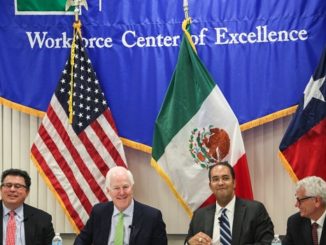
San Antonio Express-News Editorial Board
Free trade was turned into a boogeyman this election season, which means it’s incumbent on Texas’ elected officials to speak up for its benefits.
The first place to start is bipartisan and vocal support for legislation that would allow cities (technically nonfederal entities) along the U.S.-Mexico border to pay for customs agents and facilities that will speed up processing of goods. This means paying the salaries or overtime for additional customs workers or building cooling facilities so produce doesn’t go bad while it waits at the border.
U.S. Sen. John Cornyn and U.S. Rep. Henry Cuellar have backed this legislation. Ideally, the federal government would pay for these services and infrastructure, but this is the next best option. The city of El Paso, under a pilot program of this legislation, has seen a 10-to-1 return on its investment to speed up commercial traffic.
This effort comes at a critical time. President-elect Donald Trump made trade, NAFTA, in particular, a scapegoat for the loss of manufacturing jobs in this country.
It was an argument that played well in the Rust Belt but could dramatically disrupt Texas’ economy. The Lone Star State’s export economy is tops in the nation by a wide margin.
Just in 2015, Texas exported $92.5 billion in goods to Mexico, according to the International Trade Administration. Blowing up NAFTA means blowing up this trade. That means blowing up the 382,000 jobs here that the Woodrow Wilson International Center for Scholars has said are linked to trade with Mexico.
Trump and his advisers have yet to say just what they will change about NAFTA, but if he moves in a protectionist direction, hitting Mexican imports with extreme tariffs and threatening American companies for making economic decisions, Texas will pay the price.
Will Texas’ elected officials advocate for free trade? Our hope is Cornyn, Cuellar, U.S. Sen. Ted Cruz, U.S. Rep. Lamar Smith, U.S. Rep. Will Hurd and others speak will loudly about trade in Texas.
Our trade relationship with Mexico is far more complex than the simple narrative of losing jobs to the south. The reality is that NAFTA likely has saved manufacturing jobs in the U.S.
Why? Because a lot of what is manufactured in North America travels back and forth across borders (another reason to keep goods moving with the Cornyn-Cuellar legislation). An engine might be assembled in Mexico, but a key component might be made in Texas. Without that dynamic, the U.S. probably would have lost more manufacturing jobs to China, according to Gordon Hanson, an economist specializing in NAFTA with the University of California, San Diego.
The biggest threat to manufacturing jobs isn’t Mexico or NAFTA, it’s automation, which will continue to develop.
After nearly 23 years, there are changes that could make NAFTA stronger. It’s in need of new chapters on e-commerce, for example. It deserves annual review. Perhaps some small special tariffs could reduce our trade imbalance with Mexico, which hit nearly $61 billion in 2015. Often overlooked, one of NAFTA’s failings is it hasn’t meaningfully improved living standards in Mexico. Addressing this would likely curb illegal immigration.
Addressing these issues, or at least some of them, is much different from tearing up the agreement or shifting into a trade war. That would be bad for America and terrible for Texas. That’s why our elected officials need to speak up about the benefits of trade. The place to start is with this legislation that will empower border communities.



